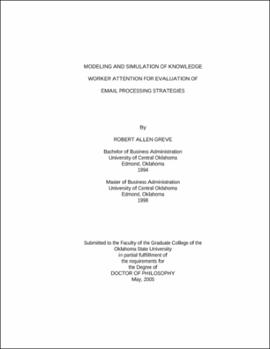| dc.contributor.advisor | Sharda, Ramesh | |
| dc.contributor.author | Greve, Robert Allen | |
| dc.date.accessioned | 2013-11-26T08:25:30Z | |
| dc.date.available | 2013-11-26T08:25:30Z | |
| dc.date.issued | 2005-05 | |
| dc.identifier.uri | https://hdl.handle.net/11244/6800 | |
| dc.description.abstract | Scope and Method of Study: Even small gains in the efficient management of email can have big impacts on organizations because of the volume of email received by most knowledge workers. This study proposed that 1) knowledge workers should use available means to separate urgent from non-urgent email messages, and 2) the non-urgent email should be treated differently - primarily it should not be allowed to interrupt the knowledge worker's primary activities. The study compares the effects of various email processing strategies on various knowledge worker performance outcomes including email resolution time, knowledge worker efficiency and total hours spent working daily. High level knowledge workers who were dependent on email for their work lives were interviewed, and interesting insights into how and why email is processed were gained. The study then explored what type of impact various alternatives to continuously monitoring email might have on the knowledge worker's performance. Simulation was used to create the email environment faced by a knowledge worker. The various email processing strategies were then simulated and the performance measures were collected and compared across various email processing strategies. A Multivariate Analysis of Variance (MANOVA) was performed comparing performance measures (knowledge worker efficiency, email resolution time, and total hours worked daily) across groups, each group corresponding to an alternative email processing strategy. Next, optimization software (Optquest) was used to find optimal email processing strategies, given constraints on performance. Finally, the results of the optimization were compared against those obtained through brute force analysis. | |
| dc.description.abstract | Findings and Contributions: Processing all non-urgent email messages only twice daily or processing all non-urgent email in batches corresponding to 1/2 of one day's email processing load allowed for statistically significant (a = 0.001) gains in knowledge worker efficiency of 3%, when compared to continuously monitoring email messages. These gains imply hours of time that could be saved by individual knowledge workers after only weeks of time. Furthermore, these gains were not made at the expense of the appropriate resolution of email. The optimization software, Optquest, also was successful at finding optimal email processing strategies, given constraints on performance. The results of the Optquest software were consistent with those results obtained through brute force analysis. | |
| dc.format | application/pdf | |
| dc.language | en_US | |
| dc.rights | Copyright is held by the author who has granted the Oklahoma State University Library the non-exclusive right to share this material in its institutional repository. Contact Digital Library Services at lib-dls@okstate.edu or 405-744-9161 for the permission policy on the use, reproduction or distribution of this material. | |
| dc.title | Modeling and simulation of knowledge worker attention for evaluation of email processing strategies | |
| dc.contributor.committeeMember | Ireland, Timothy C. | |
| dc.contributor.committeeMember | Kamath, Manjunath | |
| dc.contributor.committeeMember | Kletke, Marilyn G. | |
| dc.contributor.committeeMember | Wilson, Rick L. | |
| osu.filename | Greve_okstate_0664D_1341 | |
| osu.accesstype | Open Access | |
| dc.type.genre | Dissertation | |
| dc.type.material | Text | |
| dc.subject.keywords | email | |
| dc.subject.keywords | information overload | |
| dc.subject.keywords | knowledge work | |
| dc.subject.keywords | simulation | |
| dc.subject.keywords | modeling | |
| dc.subject.keywords | email overload | |
| thesis.degree.discipline | Business Administration | |
| thesis.degree.grantor | Oklahoma State University | |
